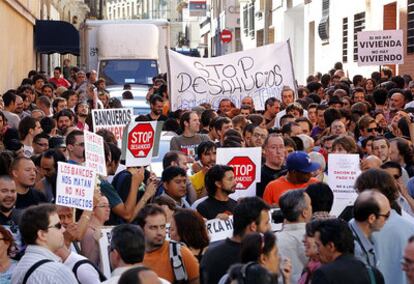Congress closes the door on option of walkaway mortgages
Parties reject initiative to let borrowers settle debt by handing over property
The cross-party Congressional sub-committee set up three months ago to look into reforming the Spanish mortgage system has rejected proposals that would allow borrowers unable to meet mortgage repayments to cancel their debt by handing over the keys to the property to the lender, an approach that is permitted in much of the United States.
Instead, the commission has put forward proposals that would see greater regulation of the agencies that set the value of properties - these agencies have been accused of working in cahoots with banks to inflate house prices.
In early July the government passed a decree that seeks to address the plight of evicted debtors. It protects more of their wages from being claimed by banks, and changes the way such people's post-foreclosure debt is calculated, to try to trim it.
The commission has put forward proposals that would se greater regulation
"Everyone agrees we need to address abuses in the system"
The Platform for Mortgage Victims - the association that has staged rallies to prevent the authorities issuing eviction orders to borrowers who cannot meet their repayments, and is part of the broader 15-M popular protest movement - wants Spain to usher in US-style mortgage legislation.
At present, if a bank manages to sell a foreclosed home, that amount is struck off the remaining debt. But the norm these days is that the property is put up for auction and nobody bids. That has meant the bank then takes over the house for just half its originally assessed value, and wipes the amount off the remaining debt - leaving the borrower still owing. The legislation passed in early July raises the proportion the bank has to effectively pay in the event of non-sale to 60 percent.
"Everybody on the committee agrees we need to address abuses in the system. Banks are demanding not just the money that hasn't been paid back, but huge amounts of back payment," says Pere Macías of Catalan nationalists CiU.
"We have to take measures that will reduce interest on delayed payment, which, when added to legal costs, can increase the amount borrowers must pay back by as much as 30 percent," adds Fernando Méndez, a property registrar who appeared before the committee.
The Spanish Banking Association says that walkaway mortgages would wreck Spain's low-interest-rate mortgage system: even now, as loan-shy banks raise rates, they can be below 3 percent, with repayment periods of as much as 40 years and no mandatory mortgage default insurance.
The result of a walkaway system, it says, would be banks granting fewer, smaller and more costly loans that are repayable in a shorter time, meaning that the nearly 98 percent of mortgage-holders who do make their payments on time would suffer.
The Congressional committee has heard from representatives of the banking and real estate sector, as well as academics and those whose properties have been foreclosed. But only one of those called has backed moves to introduce a walkaway system.
"We need structural change; a change to a law that currently favors banks, and we also need to introduce temporary legislation allowing for borrowers to return the keys to their property," said Gonzalo Bernados, who teaches at the University of Barcelona. "This is an exceptional situation, and requires exceptional solutions. This move might cost, at the absolute outside, 20 billion euros. The banks will receive much more from the state through official budgets," he adds.
"If we allowed walkaway mortgages retroactively, it would make it more difficult to borrow money, particularly for people on lower incomes," says Méndez. "Borrowers who meet their repayments will be paying the price for those who don't. It would damage Spain's international reputation, and we would be seen as a country that doesn't respect private contracts."
"The best way to defuse political reform is by setting up a Congressional committee," says Adriá Alemany of the Platform for Mortgage Victims. "When it was created three months ago, they said they would prepare a detailed report on abuses. Three months later, there is no such report, and now, with elections, it is impossible that anything more will be done about this."

Tu suscripción se está usando en otro dispositivo
¿Quieres añadir otro usuario a tu suscripción?
Si continúas leyendo en este dispositivo, no se podrá leer en el otro.
FlechaTu suscripción se está usando en otro dispositivo y solo puedes acceder a EL PAÍS desde un dispositivo a la vez.
Si quieres compartir tu cuenta, cambia tu suscripción a la modalidad Premium, así podrás añadir otro usuario. Cada uno accederá con su propia cuenta de email, lo que os permitirá personalizar vuestra experiencia en EL PAÍS.
¿Tienes una suscripción de empresa? Accede aquí para contratar más cuentas.
En el caso de no saber quién está usando tu cuenta, te recomendamos cambiar tu contraseña aquí.
Si decides continuar compartiendo tu cuenta, este mensaje se mostrará en tu dispositivo y en el de la otra persona que está usando tu cuenta de forma indefinida, afectando a tu experiencia de lectura. Puedes consultar aquí los términos y condiciones de la suscripción digital.








































